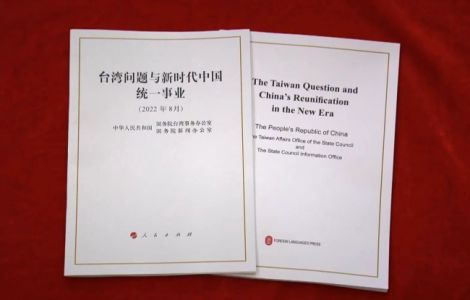中英对照:《台湾问题与新时代中国统一事业》白皮书 [5]
The Taiwan Question and China’s Reunification in the New Era [5]
新中国成立以后,以毛泽东同志为主要代表的中国共产党人,提出和平解决台湾问题的重要思想、基本原则和政策主张;进行了解放台湾的准备和斗争,粉碎了台湾当局“反攻大陆”的图谋,挫败了各种制造“两个中国”、“一中一台”的图谋;促成联合国恢复了中华人民共和国的合法席位和一切权利,争取了世界上绝大多数国家接受一个中国原则,为实现和平统一创造了重要条件。中共中央还通过适当渠道与台湾当局高层人士接触,为寻求和平解决台湾问题而积极努力。
After the founding of the PRC in 1949, China’s Communists, under the leadership of Mao Zedong, proposed the essential guideline, underlying principle, and basic policy for peaceful settlement of the Taiwan question. The CPC prepared and worked for the liberation of Taiwan, thwarted the Taiwan authorities’ plans to attack the mainland, and foiled attempts to create “two Chinas” and “one China, one Taiwan”. Through their efforts, the lawful seat and rights of the PRC in the United Nations were restored and the one-China principle was subscribed to by the majority of countries, laying important groundwork for peaceful reunification. The CPC central leadership established high-level contact with the Taiwan authorities through proper channels in pursuit of a peaceful solution to the Taiwan question.
中共十一届三中全会以后,以邓小平同志为主要代表的中国共产党人,从国家和民族的根本利益出发,在实现中美建交的时代条件下,在争取和平解决台湾问题思想的基础上,确立了争取祖国和平统一的大政方针,创造性地提出了“一个国家,两种制度”的科学构想,并首先运用于解决香港问题、澳门问题;主动缓和两岸军事对峙状态,推动打破两岸长期隔绝状态,开启两岸民间交流合作的大门,使两岸关系进入新的历史阶段。
Following the Third Plenary Session of the 11th CPC Central Committee in 1978, with the establishment of diplomatic relations between the PRC and the United States, China’s Communists, led by Deng Xiaoping, defined the fundamental guideline for peaceful reunification in the vital interests of the country and the people and on the basis of the consensus for peaceful settlement of the Taiwan question. The CPC introduced the creative and well-conceived concept of One Country, Two Systems, and applied it first in resolving the questions of Hong Kong and Macao. It took action to ease military confrontation across the Taiwan Straits, restore contact, and open up people-to-people exchanges and cooperation, opening a new chapter in cross-Straits relations.
中共十三届四中全会以后,以江泽民同志为主要代表的中国共产党人,提出发展两岸关系、推进祖国和平统一进程的八项主张③;推动两岸双方达成体现一个中国原则的“九二共识”,开启两岸协商谈判,实现两岸授权团体负责人首次会谈,持续扩大两岸各领域交流合作;坚决开展反对李登辉分裂祖国活动的斗争,沉重打击“台独”分裂势力;实现香港、澳门顺利回归祖国,实行“一国两制”,对解决台湾问题产生积极影响。
After the Fourth Plenary Session of the 13th CPC Central Committee in 1989, China’s Communists, led by Jiang Zemin, made eight proposals for the development of cross-Straits relations and the peaceful reunification of China[3]. The CPC facilitated agreement across the Straits on the 1992 Consensus, which embodies the one-China principle. It initiated cross-Straits consultations and negotiations, resulting in the first talks between heads of the non-governmental organizations authorized by the two sides of the Straits, and expanded cross-Straits exchanges and cooperation in various fields. The CPC took firm action against separatist activities led by Lee Teng-hui, and struck hard at the separatist forces seeking “Taiwan independence”. It ensured the smooth return of Hong Kong and Macao to China, and applied the policy of One Country, Two Systems, which had a constructive impact on the settlement of the Taiwan question.
中共十六大以后,以胡锦涛同志为主要代表的中国共产党人,提出两岸关系和平发展重要思想;针对岛内“台独”分裂活动猖獗制定实施《反分裂国家法》,举行中国共产党和中国国民党两党主要领导人60年来首次会谈,坚决挫败陈水扁“法理台独”图谋;开辟两岸关系和平发展新局面,推动两岸制度化协商谈判取得丰硕成果,实现两岸全面直接双向“三通”,签署实施《海峡两岸经济合作框架协议》,两岸关系面貌发生深刻变化。
After the 16th CPC National Congress in 2002, China’s Communists, led by Hu Jintao, highlighted the importance of peaceful development of cross-Straits relations. The CPC pushed for the enactment of the Anti-Secession Law to curb separatist activities in Taiwan, hosted the first talks between the leaders of the CPC and the Kuomintang in six decades since 1945, and defeated attempts by Chen Shui-bian to fabricate a legal basis for “independence”. The CPC effected profound changes in moving the peaceful development of cross-Straits relations forward by promoting institutionalized consultations and negotiations that produced fruitful results, establishing overall direct two-way links in mail, business and transport, and facilitating the signing and implementation of the Economic Cooperation Framework Agreement.
中共十八大以来,以习近平 同志为主要代表的中国共产党人,全面把握两岸关系时代变化,丰富和发展国家统一理论和对台方针政策,推动两岸关系朝着正确方向发展,形成新时代中国共产党解决台湾问题的总体方略,提供了新时代做好对台工作的根本遵循和行动纲领。
After the 18th CPC National Congress in 2012, China’s Communists, under the leadership of Xi Jinping, took a holistic approach to cross-Straits relations in keeping with changing circumstances, added substance to the theory on national reunification and the principles and policies concerning Taiwan, and worked to keep cross-Straits relations on the right track. The CPC developed its overall policy for resolving the Taiwan question in the new era, and set out the overarching guideline and a program of action.
2017年10月,中共十九大确立了坚持“一国两制”和推进祖国统一的基本方略,强调:“绝不允许任何人、任何组织、任何政党、在任何时候、以任何形式、把任何一块中国领土从中国分裂出去!”
At its 19th National Congress in October 2017, the CPC affirmed the basic policy of upholding One Country, Two Systems and promoting national reunification, and emphasized its resolve never to allow any person, any organization, or any political party, at any time or in any form, to separate any part of Chinese territory from China.
2019年1月,习近平总书记在《告台湾同胞书》发表40周年纪念会上发表重要讲话,郑重提出了新时代推动两岸关系和平发展、推进祖国和平统一进程的重大政策主张:携手推动民族复兴,实现和平统一目标;探索“两制”台湾方案,丰富和平统一实践;坚持一个中国原则,维护和平统一前景;深化两岸融合发展,夯实和平统一基础;实现同胞心灵契合,增进和平统一认同。
In January 2019, Xi Jinping, general secretary of the CPC Central Committee and president of China, addressed a meeting marking the 40th anniversary of the release of the Message to Compatriots in Taiwan. In his speech, Xi Jinping proposed major policies to advance the peaceful development of cross-Straits relations and the peaceful reunification of China in the new era. These are: first, working together to promote China’s rejuvenation and its peaceful reunification; second, seeking a Two Systems solution to the Taiwan question and making innovative efforts towards peaceful reunification; third, abiding by the one-China principle and safeguarding the prospects for peaceful reunification; fourth, further integrating development across the Straits and consolidating the foundations for peaceful reunification; fifth, forging closer bonds of heart and mind between people on both sides of the Straits and strengthening joint commitment to peaceful reunification.
中国共产党和中国政府采取一系列引领两岸关系发展、促进祖国和平统一的重大举措:
The CPC and the Chinese government have thereby adopted a series of major measures for charting the course of cross-Straits relations and realizing China’s peaceful reunification:
——推动实现1949年以来两岸领导人首次会晤、直接对话沟通,将两岸交流互动提升到新高度,为两岸关系发展翻开了新篇章、开辟了新空间,成为两岸关系发展道路上一座新的里程碑。双方两岸事务主管部门在共同政治基础上建立常态化联系沟通机制,两部门负责人实现互访、开通热线。
– The CPC and the Chinese government have facilitated the first meeting and direct dialogue between leaders of the two sides since 1949, raising exchanges and interactions to new heights, opening up a new chapter, and creating new space for cross-Straits relations. This is a new milestone. The departments in charge of cross-Straits affairs on both sides have established regular contact and communication mechanisms on a common political foundation, and the heads of the two departments have exchanged visits and set up hotlines.
——坚持一个中国原则和“九二共识”,推进两岸政党党际交流,与台湾有关政党、团体和人士就两岸关系与民族未来开展对话协商,深入交换意见,达成多项共识并发表共同倡议,与台湾社会各界共同努力探索“两制”台湾方案。
– Upholding the one-China principle and the 1992 Consensus, the CPC and the Chinese government have facilitated exchanges between political parties across the Straits, and conducted dialogues, consultations, and in-depth exchanges of views on cross-Straits relations and the future of the Chinese nation with relevant political parties, organizations, and individuals in Taiwan. These efforts have resulted in consensus on multiple issues, and promoted a number of joint initiatives exploring the Two Systems solution to the Taiwan question with all sectors of Taiwan society.
注:为确保中英对照准确,“热词译”网站可能对中英文重新分段。

